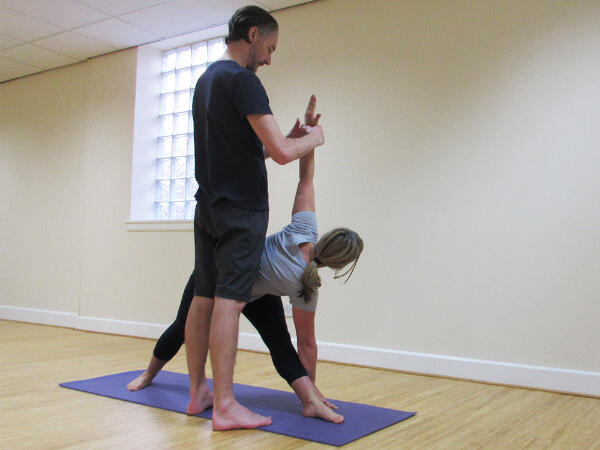Becoming A Yoga Teacher
Published: April 24, 2018

‘As in passing a driving test, it is only after the qualification is gained that the real learning begins’ Alan Brown (1)’
There will be quite a few of my students gearing up for an assessment in June. They are on the path to becoming an Iyengar Yoga teacher. It is very easy to focus on this end result and the process of becoming a teacher rather than simply being a yoga practitioner. By focussing on the practice you will never pass or fail as the learning that evolves over time can never be taken away.
Why would you want to become an Iyengar teacher?
Training to become a yoga teacher involves a considerable amount of dedication and time. The system will be changing over the next couple of years but for the moment, to become an Iyengar Yoga teacher you need to have been practicing for a minimum of 3 years. The training days are often monthly, weekly or fortnightly. This depends mainly on where you live and what your trainer can provide, and the training takes about two years to complete in all. However, teacher training is much much more than this one day. It is your attendance at class. If you are considering teacher training you should be attending a level 3 class. You should also be refining your poses from the introductory syllabus and attending workshops. Your yoga journey should also be explored through your own self practice.
What is self practice?
The Iyengar family place great importance on self practice. It is expected. It is your discipline, your exploration, your discovery, your experimentation, your chance to reinforce points made by your teacher in class or at workshops. Self practice is what will help you become a teacher. It means getting up earlier than the rest of your family so you can practice. It means getting on your mat, no matter what, and working through the postures and themes you have been focussing on in class.
Intrinsic motivation
Intrinsic motivation is key to your development and maturity. If you are not intrinsically motivated then you will be constantly searching for the next goal. Perhaps the next level of assessment, perhaps just practicing so you have a class plan to teach.
Unfortunately new teachers become so excited about gaining a certificate that they enthusiastically teach too many classes and sacrifice their own practice. They stop attending classes and workshops and their own practice takes a downward curve. Self practice is more important than teaching. Yoga is a practical subject and it takes practice!
My experience
I was very fortunate when I started teacher training. My teacher was my mentor. I could ask her any questions on yoga, we would practice together, I would shadow her beginner classes and attend as many of her classes as I could. She brought visiting teachers to Glasgow and encouraged me to attend as many workshops outside of Glasgow.
This was added to my weekly training in Edinburgh with two of the most senior teachers in Scotland, Meg Laing and Elaine Pidgeon. In my first year there were about eight trainees and then in my second year only three! It was intense but very very rewarding. I am grateful for their dedication and perseverance. So I was lucky enough to have three mentors!
Always a beginner
Every time I get on my mat I discover that curiosity a beginner has. It is exciting and, of course, gives me the inspiration to return to my mat the following day.
“Your starting point today should be the end point of yesterday” Zubin Zarthoshtimanesh (1)”
In sutra 1.20, Patanjali reminds us of the five key ingredients for a yoga practitioner, for any aspirant on the spiritual path,
Virya (courage), Smrti (memory and mindfulness), Prajna (awareness) and Samadhi (absorption) (1)
(1) Iyengar yoga News, Spring 2018
